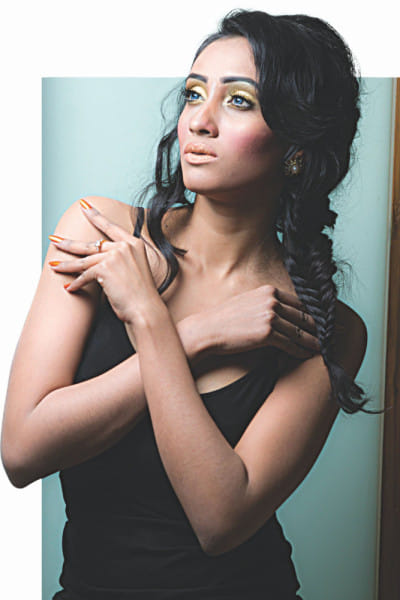Let's talk about hair fall

Heat, rain and humidity— and anyone will cringe at the thought of getting frizzy, puffed up hair. The incessant rains are not helping your mane, while umbrellas are not enough to keep the poof at bay. The more unmanageable your hair, the more hair fall you experience.
A thinning hairline not only affects the confidence of people who are older but also many a young and impressionable youngster.
Hair loss is a topic that affects both men and women. While it's true that men are more likely to lose their hair, women are more likely to experience thinning of hair.
In many cases, there are ways to treat both male and female hair loss. It all
depends on the cause. Here are some common and not-so-common reasons why you might be seeing less hair on your head.
Physical stress
Any kind of physical trauma like surgery, a car accident, or a severe illness or even the flu can cause temporary hair loss. Hair loss often becomes noticeable three-to-six months after the trauma. The good news is that hair will start growing back as your body recovers.
Lack of protein
If you don't get enough protein in your diet, your body may ration protein by shutting down hair growth. This can happen about two to three months after a drop in protein intake. There are many great sources of protein, including fish, meat, and eggs.
Male pattern baldness
About two out of three men experience hair loss by age 60, and most of the time it's due to male pattern baldness. This type of hair loss, caused by a combo of genes and male sex hormones, usually follows a classic pattern in which the hair recedes at the temples, leaving an M-shaped hairline.
Female pattern hair loss
Just as pregnancy hormone changes can cause hair loss, so can switching or going off birth-control pills. The change in the hormonal balance that occurs at menopause may also have the same result. Unlike men, women don't tend to have a receding hairline, instead, their part may widen and they may have noticeable thinning of hair.
Pregnancy
Pregnancy is one example of the type of physical stress that can cause hair loss (that and hormones). Pregnancy-related hair loss is seen more commonly after your baby has been delivered rather than actually during pregnancy. If you do experience hair loss, rest assured that your hair will grow back in a couple of months. It's a normal thing and it will work its way out.
Heredity
If you come from a family where relatives started to have hair loss at a certain age, then you might be genetically more prone to it.
Underlying medical reasons
Persistent and concurrent medical issues like stomach upset, sore throat, a thyroid condition can reduce your intake of nutrients absorption that is required for healthy hair growth as well. Plan a visit to your GP and get a blood work done to rule out any of these conditions.
Almost one in 10 women aged 20 through 49 suffers from anaemia due to an iron deficiency, which is an easily fixable cause of hair loss. A simple iron supplement should correct the problem.
An underactive thyroid gland may also affect metabolism as well as growth and development and can contribute to hair loss. Medication to the rescue --once your thyroid levels return to normal, so should your hair.

Dramatic weight loss
Sudden weight loss is a form of physical trauma that can result in thinning hair. This could happen even if the weight loss is ultimately good for you. Sudden weight loss seems to shock the system and you'll have a six-month period of hair loss and then it corrects itself. Remember that it is ultimately better for you to be in the normal weight category rather than being obese.
Over-styling
Vigorous styling and hair treatments over the years can cause your hair to fall out. Examples of extreme styling include tight braids, hair weaves or corn rows as well as chemical relaxers to straighten your hair, hot-oil treatments or any kind of harsh chemical or high heat. Because these practices can actually affect the hair root, your hair might not grow back.
Ageing
It's not uncommon to see hair loss or thinning of the hair in men and women as they enter their 50s. That leaves women with cosmetic approaches such as scarves, wigs and hair styled so as to cover up thin spots. That said, there are also plenty of tricks to prevent hair breakage and ways to keep your hair looking shiny and healthy as you age.
Why does hair loss particularly happen during the rains?
While hair loss of about 50 to 100 strands a day is considered normal by dermatologists that number multiplies to 200 during the rains. And excessive hair loss needs to be addressed.
The presence of excessive moisture on the scalp can increase the risk of fungal infections, thereby weakening hair roots and leading to hair fall.
Generally, if it has rained after a gap, the rain is considered to be acidic; the chemicals suspended on the stands can cause hair fall.

Dry Hair or No Hair
It's essential to keep your hair dry as far as possible. So yes, try and keep moisture and wetness out of your hair.
Don't go ballistic on the dryer
Using the dryer on high can lead to hair loss. It is imperative to keep it on a medium so the hair shaft is not overheated. Prolonged use of a dryer also leads to dry, brittle hair and ultimately, hair loss. It is best to let your wet hair air-dry for a while, and then use a dryer, if needed.
Don't binge on hair styling products
Due to the excess humidity in the air owing to the rains, chemical based products will make your hair very greasy. Besides feeling icky and causing hair fall, it can also damage your scalp and cause dandruff too.
Don't Skip Conditioning on Any Condition
As you may have already experienced, hair tends to become frizzy, weak and prone to falling due to the humidity in the monsoon season. Which is why, regular conditioning is a great way to counter this and give your hair the kind of softness and silkiness that you've become used to!
Bottoms up!
One more thing; don't forget to drink lots of water to stay hydrated. This will do wonders for your hair! So, while rain may fall till the clouds are empty, your hair won't fall now that you know how to deal with it.
By Amreen Bari
Photo: LS Archive/Sazzad Ibne Sayed

 For all latest news, follow The Daily Star's Google News channel.
For all latest news, follow The Daily Star's Google News channel. 



Comments